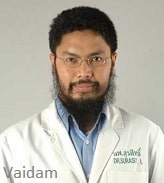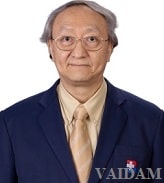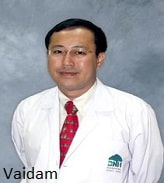The cancerous growth or cancer arising in the tissue of the lungs is known as lung cancer.
It has the highest mortality rate among cancer deaths. People who smoke are at high risk of having lung cancer.
There are mainly two types of small cell lung cancer and non-small cell cancer.
Symptoms are nonspecific until the advanced stage is reached. The common symptoms are
Treatment of lung cancer depends mainly on cancer's stage and location and the patient's age.
For early-diagnosed cases, we can do surgical removals like
In advanced cases, Pneumonectomy is done, which means the removal of entire lungs. Surgery is followed by -
The cost of Lung Cancer includes:
Preoperative diagnostic tests cost may include [Blood tests, X-rays, sputum cytology, etc.]
Surgery cost (Depends upon the type and size of the tumour and the extent to which the tumour has spread)
Post-Operative cost (there might be a need for chemotherapy or Radiotherapy before or post-surgery)
Medicines
Patient's hospital stay
The overall cost of the procedure also varies based on the patient's condition and preferences. Some of these factors are:
Type of hospital and room opted (General, Twin sharing, or single room)
The stage and type of cancer
Patients may require repeated investigation through PET CT and related tests Post-surgery / Chemotherapy / Radiation Therapy
Any additional tests may be required to know the status of the disease during the course of treatment
An extended stay at the Hospital
Cost of Accommodation during follow-ups, in case the patient is not a local resident [may take longer duration in case of chemotherapy or radiotherapy sessions]
Listing approximate price of Lung Cancer Treatment and some related procedures. The prices may change depending upon the centers and condition of the patient.
| Treatment name | Cost range |
|---|---|
| Lung Cancer Treatment | USD 19800 to USD 24200 |
| Chemotherapy | USD 1350 to USD 1650 |
To start with the process, a chest x-ray is the first test that will be done to check any abnormal areas in the lungs. After that, A CT scan is done to reveal any small lesions in lungs that may not have been detected on an X-ray. Generally, a sputum cytology is also done if you are producing sputum due to cough to check the presence of lung cancer cells. The package typically doesn’t include the cost of these tests.
The chemotherapy drugs taken post liver transplant are not a part of the package and cost extra. The most common ones include bevacizumab in combination with chemotherapy and atezolizumab, which is an immunotherapy drug. In the case of targeted therapy and immunotherapy related medicines, the are not a part of the package.
You need to take the medicines prescribed by your doctor in case you experience pain. The medicines are not covered in the package. You may also be at a higher risk for getting another lung cancer or any other types of cancer. To avoid this, it is recommended to go for post-treatment management to check an early detection of any recurrences that might be cured at an early stage, this is also not a part of the procedure cost.
For patients planning to travel abroad it is useful to know the price in destinations popular with medical travellers. The price for Lung Cancer in different countries is approximately:
A team of Pulmonologists, Cardiothoracic Surgeons and medical and radiation oncologists are required for the complete diagnosis and treatment of lung cancer.
Listing popular specialists:

Consultant, 40 years of experience

Oncology Internal Medicine

Dr. Narongsak Kiatikajornthada
Consultant, 52 years of experience

Oncology Hematology

Consultant, 43 years of experience

Chemotherapy Oncology

Consultant, 21 years of experience

Internal Medicine Gastrointestinal Oncology

Consultant, 28 years of experience

Bone marrow transplantation

Clin. Prof. Dr. Sudsawat Laohavinij
Consultant, 28 years of experience

Internal Medicine, Medical Oncology and Pain Management.

Dr. Surachat Chakrapee-Sirisuk
Consultant, 40 years of experience

Internal Medicine and Medical Oncology.

Assoc. Prof. Vichien Srimuninnimit
Associate Professor, 30 years of experience

Diagnosing and treating cancer in adults Chemotherapy Hormonal therapy Biological therapy Targeted therapy

Assoc. Prof. Dr. Suporn Chuncharunee
Associate Professor, 34 years of experience

Immunotherapy Chemotherapy

Consultant, 32 years of experience

Chemotherapy Immunotherapy

Consultant, 36 years of experience

Retinoblastoma and Orbital Tumors

Consultant, 32 years of experience

• X-ray Imaging • Ultrasonography Diagnostic Imaging • Breast Cancer X-ray Screening (Mammogram) • Magnetic Resonance Imaging (MRI • Computed Tomography (CT) X-ray Scanning • Breast, thyroid, esophagus, cervical, ovarian, gastroenterological cancer • Tissue and Specimen Analysis • Pap smear

Consultant, 27 years of experience

Hematology Oncology

Consultant, 54 years of experience

Medical Oncology

Assoc. Prof. Col. Dr. Wichean Mongkonsritragoon
Consultant, 37 years of experience

Treatment of hemophilia, leukemia, and lymphoma.

Assoc. Prof. Dr. Theera Umsawasdi
Consultant, 57 years of experience

Immunotherapy Targeted therapy

Consultant, 15 years of experience

Chemotherapy Immunotherapy

Consultant, 18 years of experience

General gynecologic, Gynecologic Oncology, Pelvic surgery, Laparoscopy, Hysteroscopy, and minimally invasive surgery

Assoc. Prof. Wichai Termrungruanglert
Associate Professor, 37 years of experience

Gynaecologic Oncology

Consultant, 35 years of experience

Gynecologic Oncology
The five-year survival rate for lung cancer cases is around 20%, as most chronic smoking cases cannot be treated well.
Lungs being spongy organ, has more chances of metastasis.
Our Services for Lung Cancer Treatment in Thailand
Transparent - Professional - Without Hassles






NABH Certified Healthcare Discovery Platform
Vaidam is NABH certified healthcare discovery platform that will connect you to top-notch medical experts, hospitals, wellness options, and trusted travel partners to help identify and make the right healthcare choices.

Researched & Personalized Treatment Plan - Under One Roof
You can search for the best hospitals, read about them, view photographs of the facilities at the hospitals and the places at which the hospitals are located, and check the cost of treatment.

Quality Treatment Within Your Budget
As soon as you post an enquiry, the patient relation team will collect details from you, share them with the doctors and hospitals on Vaidam's panel, and get a personalized treatment plan. We research to get quality treatment within your budget.

Treatment to Travel
Vaidam concierge assists patients, to get medical Visa, the best airline fares and arrangements for your stay. Our concierge also helps you with daily travel, language, and food concerns. Vaidam does everything to be your perfect host. All of Vaidam’s services are free of cost to patients.

International Reach
Vaidam Health has network in 15+ countries, which includes India, Turkey, UAE, Germany, South Korea, Thailand, Malaysia, Spain.
Note: Vaidam Health does not provide medical advice, diagnosis or treatment. The services and information offered on www.vaidam.com are intended solely for informational purposes and cannot replace the professional consultation or treatment by a physician. Vaidam Health discourages copying, cloning of its webpages and its content and it will follow the legal procedures to protect its intellectual property